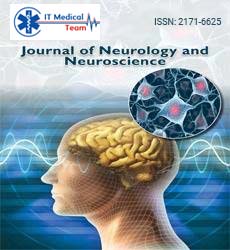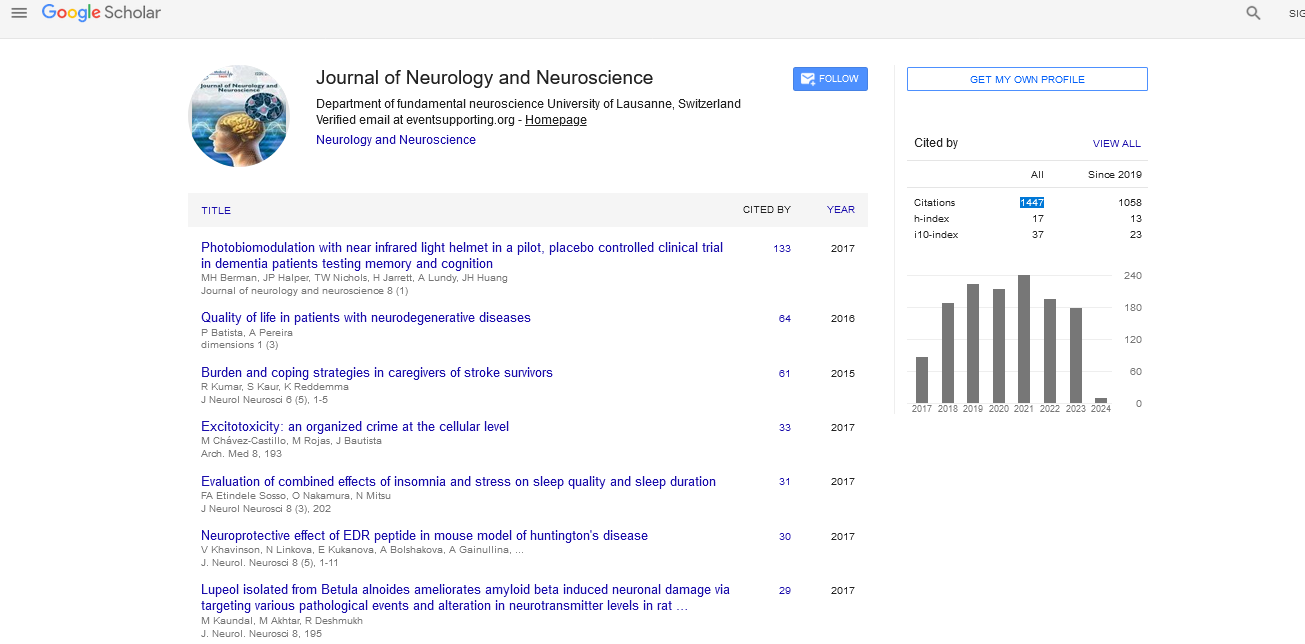Bern Schmidt1* and Eryn Rekgai2
1Department of Fundamental Neuroscience, University of Lausanne, Switzerland
2Department of Psychology and Sports Science, Justus-Liebig University, Germany
*Corresponding Author:
Dr. Bern Schmidt
Department of Fundamental Neuroscience
University of Lausanne, Switzerland
Tel: +41 21 692 50 00
E-mail: s.bern@yahoo.com
Received Date: September 06, 2018; Accepted Date: September 13, 2018; Published Date: September 18, 2018
Citation: Schmidt B, Rekgai E (2018) What is the Path of Sleep Research. J Neurol Neurosci Vol.9 No.5:268. DOI: 10.21767/2171-6625.1000268
Introduction
In the famous psychoanalytic theory of former psychologist and specialist of mental disorders, who sees in the dream the unconscious expression of suppressed desires and feelings, many theoretical ideas have since been added [1-3].
Some believe that good sleep can help memorize events, feelings or learning [4-7]. Evidenced by the involvement of several cortical areas (including the frontal region) that have a role in speech, memory, decision-making or movement [4-7]. Others believe that dreams can integrate or revise innate or acquired behaviors by their unconscious repetition during the dream.
Conversely, certain hypotheses argue that the dream is only an activity linked to awakening: it is in fact the expression of a brutal reactivation of consciousness during which the latter would perceive in a disorganized way the activity unconscious brain that occurred during the night [8,9]. Unless it is only a random brain activity, without organization or particular objects? For the time being, neuroscience makes it easier to formulate these hypotheses than to verify them.
The Next Step?
Sleep has not yet revealed all the secrets: In terms of memorization, the experimental data have for the time being difficult to distinguish the specific role of each phase of sleep on this process or their interaction with the environment around [8,10,11]. If slow sleep seems to be well involved in the process of memorization, paradoxical sleep would not be left out: it constitutes the major part of the sleep time of newborns and young children [12-14]. And disrupting or suppressing it causes brain architecture disorders in the rat. More and more data allow us today to attribute to it a growing role in certain processes of memorization, and in particular those of the declarative or conscious memory.
At the same time, studies have found a link between sleep disorders and impaired cognitive abilities [5,7,9], via an increased presence of senile plaques. The link between sleep and the ability to evacuate toxins from brain tissue has been demonstrated. However, a better understanding of the mechanisms involved is needed today. In particular, it will make it possible to determine whether cognitive disorders are related to sleep disorders, or whether they are the ones that ultimately promote cognitive decline [15-18]. An egg and chicken problem in short, which is not unique: epidemiological data also suggest a link between sleep and depression: do sleep disorders make people vulnerable to the risk of depression or the risk of depression? depression influence the quality of sleep? Similarly, epidemiological observations show an increased risk of arterial hypertension, hypercholesterolemia, or cardiovascular events (stroke, coronary artery disease) in people with poor sleep quality [19]. These observations are now the subject of research that will better understand the mechanisms.
In the same way, the links between sleep and immunity will have to be better described. Beyond the understanding of the role of sleep in our vulnerability to infections, the mechanisms that will be identified will probably help to understand the increase in the frequency of cancer among night workers: the over-risk of breast cancer, Prostate or colon could not only be linked to poorer immunity, but also to desynchronization of the circadian rhythm, which influences certain molecular signaling pathways [20]. How often are sleep disorders? How and why does it evolve? What is its impact in epidemiological or individual terms? All these questions are the subject of many scientific works that sift through all the factors of daily life that determine the quality of sleep: rhythms of personal life, school or work, the influence of food, use of new technologies of which light disrupts our nights. This work can provide useful information in terms of public health and individual health, but also information to improve knowledge and prevention of traumatic events (road, domestic ...) or occupational health. In the latter area, issues relating to night work or shift work - which changes work and sleep schedules - need to be further developed. A lack of sleep is linked to many health problems, including a weakened immune system and a higher risk of high blood pressure, heart problems, diabetes and stroke [21,22]. It can also contribute to depression, weight gain, forgetfulness, loss of judgment, and premature aging.
Conclusion and the Future Research
Each individual is confronted at some point with health issues and decisions. Will I vaccinate my child? Which doctor will I go to? How can I eat healthier? Which treatment is best to follow? More and more patients are actively taking part in decisions related to their health and becoming enlightened patients. To take on this active role, different skills are needed. These skills are the essence of the concept of health literacy. This concept is defined as the knowledge, motivation and skills of individuals to access, understand, evaluate and use health information in order to make judgments and make decisions in everyday life with respect to health, disease prevention and health promotion so as to maintain or improve the quality of life.
The non-modifiable determinants involved in sleep are also among the most promising axes: studies in screening genetics make it possible to identify genetic determinants involved in the diversity of sleep patterns. The precise study of particular sleep disorders, such as narcolepsy, or associated with certain diseases, such as Parkinson's, can bring interesting lessons for the understanding of certain neuro-hormonal or metabolic pathways constituting the essential pivots of good quality and quantity. sleep. Hopefully, the most recent Nobel prize awarded to chronobiology will boost research in sleep medicine in more various areas than what exist now.
23357
References
- Friedman EM, Love GD, Rosenkranz MA, Urry HL, Davidson RJ, et al. (2007) Socioeconomic status predicts objective and subjective sleep quality in aging women. Psychosom Med 69: 682-691.
- Hawkley, LC, Lavelle LA, Berntson GG, Cacioppo JT (2011) Mediators of the relationship between socioeconomic status and allostatic load in the Chicago Health, Aging, and Social Relations Study (CHASRS). Psychophysiology 48: 1134-1145.
- Stawski RS, Cichy KE, Piazza JR, Almeida DM (2013) Associations among daily stressors and salivary cortisol: findings from the National Study of Daily Experiences. Psychoneuroendocrinology 38: 2654-2665.
- Sosso FAE, Molotchnikoff S (2016) Relationship between cognitive impairment and the combined effects of environmental factors In: 2nd Expert Annual Meeting on Neurocognitive Disorders and Stress Management.
- Sosso FAE , Raouafi S (2016) Appropriate sleep duration and physical activity modulate cognitive improvement. J Sleep Disor: Treat Care 5: 4.
- Sosso FAE (2017) Negative involvement of the working environment in the occurrence of cognitive disorders. Transl Biomed 8: 2.
- Sosso FAE, Raouafi S (2016) Brain disorders: Correlation between cognitive impairment and complex combination. Mental Health in Family Medicine 12: 215-222.
- Sosso FAE, Hito M, Bern S (2017) Basic activity of neurons in the dark during somnolence induced by anesthesia. J Neurol Neurosci 8.
- Sosso FAE (2017) Visual dot interaction with short-term memory. Neurodegener Dis Manag 7: 3.
- Sosso FAE (2017) Neurocognitive game between risk factors, sleep and suicidal behaviour. Sleep Science 10: 41-46.
- Van CE, Spiegel K (1999) Sleep as a mediator of the relationship between socio-economic status and health: A hypothesis. Ann N Y Acad Sci 896: 254-261.
- Sosso FAE, Nakamura O, Mitsu N (2017) Evaluation of combined effects of insomnia and stress on sleep quality and sleep duration. J Neurol Neurosci 8.
- Goodin BR, McGuire L and Smith MT (2010) Ethnicity moderates the influence of perceived social status on subjective sleep quality. Behav Sleep Med 8: 194-206.
- Karlamangla AS, Friedman EM, Seeman TE, Stawksi RS, Almeida DM (2013) Daytime trajectories of cortisol: Demographic and socioeconomic differences--Findings from the National Study of Daily Experiences. Psychoneuroendocrinology 38: 2585-2597.
- Sosso FAE (2017) African burden of mental health: Rethinking primary care in mental health. Journal of Alzheimer's Parkinsonism & Dementia 2:2.
- Sosso FAE (2018) Allostastic load and allostatic weight: A literature review of a confusing concept. J Neurol Neurosci 9: 242-247.
- Sosso FAE, Nakamura O, Nakamura M (2017) Epidemiology of Alzheimer’s Disease: Comparison between Africa and South America. J Neurol Neurosci 8: 204-207.
- Sosso FAE, Nakamura O, Mitsu N (2017) African burden of mental health: necessity of global exchange between researchers. J Adv Res in Biotechnol 2: 1-2.
- Tom SE, Berenson AB (2013) Associations between poor sleep quality and psychosocial stress with obesity in reproductive-age women of lower socioeconomic status. Women’s Health Issues 23: 295-300.
- Tobaldini E, Costantino G, Solbiati M, Cogliati C, Kara T, et al. (2016) Sleep, sleep deprivation, autonomic nervous system and cardiovascular diseases. Neurosci Biobehav Rev 74: 321-329.
- Kaczor M, Skalski M (2016) Prevalence and consequences of insomnia in pediatric population. Psychiatr Pol 50: 555-569.
- Mercier J, Savard J, Bernard P (2016) Exercise interventions to improve sleep in cancer patients: A systematic review and meta-analysis. Sleep Med Rev 36: 43-56.





